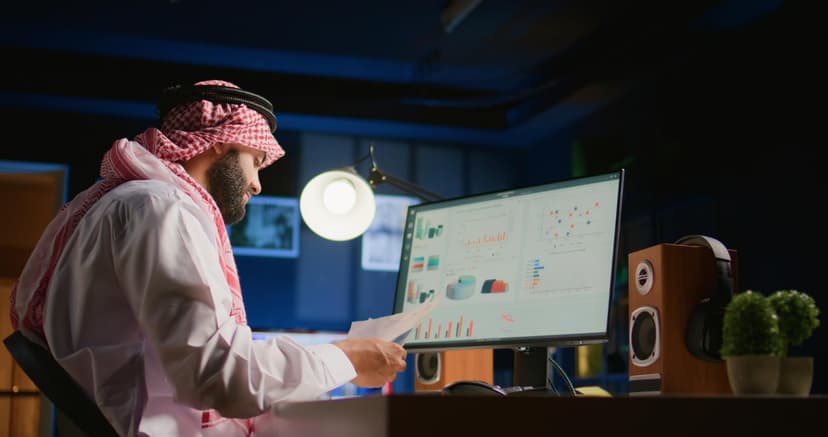


The Kingdom of Saudi Arabia is witnessing a radical transformation across various economic and social sectors, and the Vision 2030 program is the primary driver of this change. One of the most prominent sectors impacted by this transformation is marketing, as marketing strategies in the Saudi market have evolved to keep pace with this transformation and achieve the ambitious vision's aspirations.
In this article, we review how Vision 2030 has impacted marketing plans and strategies, and the new trends that have emerged in the Saudi business environment.
1. Digital Transformation and Modernization of Marketing Channels
Digital transformation is one of the most important pillars of Vision 2030, and this has directly impacted marketing methods in the Kingdom.
Traditional channels are no longer sufficient; digital marketing, via the internet and social media, has become the most prominent option.
Direct Impacts:
Expansion in the use of paid digital advertising.
Increasing reliance on platforms such as Snapchat, Twitter, and Instagram in advertising campaigns.
The proliferation of marketing tools and data analysis.
2. Women's Empowerment and the New Target Market
With the support of women's participation in the labor market and increased economic empowerment, a new consumer segment has emerged that companies must target.
Results of this trend:
Designing marketing campaigns that cater to the new interests of Saudi women.
Diversifying marketing messages to attract a larger segment of customers.
3. Supporting Small and Medium Enterprises
Vision 2030 encourages private sector development and supports entrepreneurship, creating a new competitive environment for startups.
New marketing strategies have emerged:
Using content marketing to promote small brands.
Adopting local influencer marketing to support startup products.
Low-cost and flexible digital campaigns.
4. Marketing the Tourism and Entertainment Sector
With the opening up of the tourism sector and increased investment in entertainment, the Kingdom has become a new global destination. This has led to the emergence of local and global marketing strategies to promote Saudi tourist attractions.
Real-world examples:
Promotional campaigns for AlUla, NEOM, and the Red Sea.
Using virtual reality technologies to promote tourist destinations.
Collaboration between government and private entities in marketing campaigns.
5. Building the Saudi Identity
Vision 2030 aims to strengthen national identity and raise the quality of local products. This requires companies to develop their marketing identities in line with these principles.
Emerging Trends:
Focusing on the "Made in Saudi Arabia" slogan in campaigns.
Adopting purposeful marketing that reflects Saudi values.
Investing in high-quality marketing design and language.
Conclusion: Marketing in Saudi Arabia... A Dynamic Future
Vision 2030 has brought about a qualitative shift in various aspects of life in the Kingdom, and the marketing sector has had a significant share of this change.
Marketing strategies have become more flexible, digital, and comprehensive, responding to the needs of a changing society and a growing market.
Adapting to this vision is no longer an option; it has become a necessity for any company seeking success and sustainability in the modern Saudi market.

In recent years, Saudi Arabia has witnessed a significant shift in consumer behavior and purchasing practices. Much of this transformation is due to the rise of e-commerce platforms such as Noon and Souq (now part of Amazon).
These platforms have not only changed the way individuals shop, but have also imposed a new reality on businesses and organizations, leading to the decline of traditional marketing and the emergence of more effective and impactful digital marketing strategies.
1. What distinguishes Noon and Souq?
• Ease of access and speed of service
• These platforms provide a quick and easy shopping experience via mobile apps and websites, attracting a large segment of customers who prefer online shopping to visiting traditional stores.
• Product diversity and offerings
• By offering millions of products and a variety of price and brand options, these platforms have become a comprehensive marketplace for Saudi consumers.
• Rating and reliability systems
• These platforms' reliance on customer reviews and product ratings has given consumers confidence, something that is equally difficult to achieve in traditional marketing.
• 2. The Impact of These Platforms on Traditional Marketing
📉 Decline in Traditional Advertising
Many brands have begun reducing their spending on billboards, newspaper ads, and television ads, and have begun shifting to digital campaigns through platforms such as Noon and Amazon.
💡 Changing Marketing Strategies
With the availability of intelligent analytics tools on these platforms, it has become possible to precisely target ads to a targeted audience, increasing marketing effectiveness compared to traditional mass advertising.
🛍 Merchants are moving toward online sales.
Even small stores have begun creating digital stores on Noon and Amazon to increase their reach, reducing their reliance on traditional stores.
3. Cross-Platform Marketing... A New Model
Noon and Souq now offer paid inbound marketing services, allowing sellers to:
Promote their products in search results.
Offer special discounts for seasonal events.
Analyze sales data to develop strategies.
This type of marketing relies on live data and analytics and is more effective than traditional methods that do not provide direct feedback or accurate results.
4. Challenges and Opportunities for Traditional Marketers
While traditional marketers face challenges in attracting digital consumers, there is still an opportunity to adapt by:
Moving to digital marketing and integrating with e-commerce platforms.
Leveraging visual and concise content to attract a new generation of audiences.
Focusing on building a strong digital brand rather than relying solely on physical presence.
Conclusion: Traditional Marketing vs. Digital Transformation
With the rise of platforms like Noon and Souq, it has become imperative for businesses and marketers to rethink their strategies.
Traditional marketing is no longer sufficient to reach a wide audience or achieve rapid growth rates. Digital marketing within e-commerce platforms is the true future.
Success in today's Saudi market requires understanding this transformation and adopting its tools intelligently and flexibly.